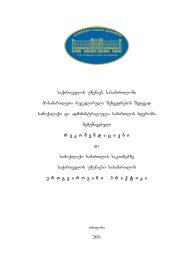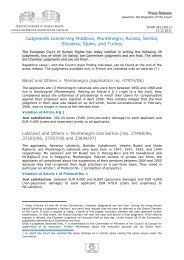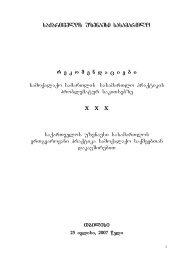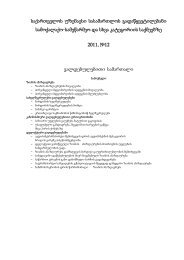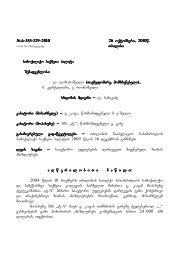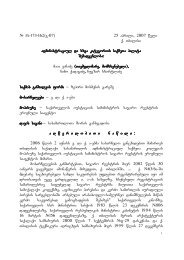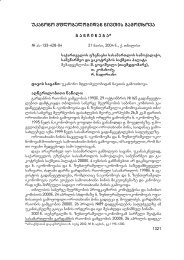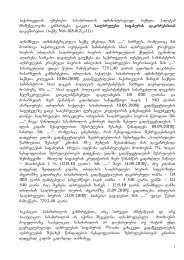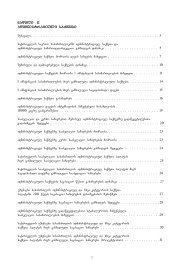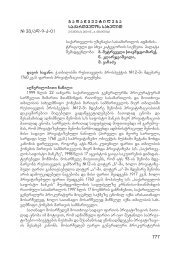doqtoranta forumiincomplete 2 . The Nuremberg Charter contained rather archaic forms of regulation on participation.Participation in a common plan or conspiracy to wage a war of aggression was a crime. 3 Under article 6 (c) ofthe Nuremberg Charter, leaders, organizers, instigators and accomplices who took part in the formulation orexecution of a common plan or conspiracy to commit a crime against international law were responsible evenfor acts performed by others in execution of the plan. 4 According to Nuremberg principles, war crime, crimeagainst peace, crime against humanity – all these are crimes against international law. 5For Nuremberg Tribunal the main aim was to punish persons committed crimes under international law.They didn‚t pay attention to the different modes of participation; they applied to the unified perpetratormodel. The guiding principle was that any support or promotion of the crime was considered as criminalparticipation. 6More complicated doctrine of criminal participation was achieved by the tribunals. Article 7(1) of ICTYStatute and article 6(1) of ICTR Statute differ the following modes of participation: committing, planning,ordering, instigating and aiding. According to jurisdiction of ad hoc tribunals, all modes of participation arecharacterized with actus reus and mens rea.Accessory liability means that the act of one person has an effect on the commission of a crime bysomeone else. In case of a commission as a principal the crime is qualified to one‚s own conduct. The ad hoctribunals pay a great attention to this distinction not only as a matter of clarifying individual criminalresponsibility, but also in sentencing. The ICTY Appeals Chamber has stated in Vasiljevic that “aiding andabetting is a form of responsibility which generally warrants a lower sentence than is appropriate toresponsibility as a co-perpetrator”. 7 The differentiation between modes of participation is no longer onlydescriptive, but indicates the heaviness of individual responsibility. This is also confirmed by recent decisionsof the ad hoc Tribunals. In Semanza, the Appeals Chamber stated that, since the conduct of an accused inthe commission of a crime fulfils the requirements of both aiding and abetting and ordering, it must bequalified as ordering. 8 The essential principle of this statement is that ordering generally requires a higherdegree of individual criminal responsibility and therefore a heavier sentence than aiding and abetting. Insum, the practice of the ad hoc Tribunals suggests that in international criminal law the unified perpetratormodel is loosing ground while a differentiated system of participation involving value-oriented levels ofresponsibility, is gaining ground.2. Article 25 of ICC StatuteIndividual Criminal Responsibility is regulated by Article 25 of the ICC Statute in detail. Paragraph 1 ofArticle 25 states that the ICC has jurisdiction over persons, not over states or organizations. Paragraph 2 ofArticle 25 reiterates the principle of individual criminal responsibility while paragraph 3 distinguishes variousmodes of individual responsibility. Article 25(3)(a) to (d) refers to modes of criminal participation,subparagraphs (e)– to the incitement to genocide; subparagraph (f) - to attempt and abandonment. Accordingto Paragraph 4 of Article 25 provisions on individual criminal responsibility do not affect the responsibilityof states under international criminal law.2Cassese A., International Criminal Law, Oxford, 2003, p. 1803Nuremberg Charter, article 6; also see Tokyo Charter, Article 5(a)4Nuremberg Tribunal, Judgment of 1 October, 1946, in the Trial of German Major War Criminals, Proceedings of theInternational Military Tribunal Sitting at Nuremberg, Germany, Part 22, p. 4495Nuremberg Charter, article 6; also see Tokyo Charter, Article 5(a)6Nuremberg Principle VII7Werle G., Principles of International Criminal Law, Hague, 2005, p. 3398Judgment, Vasiljevic (IT-98-32-A), Appeals Chamber, 25 February 2004, paragraph 182; Judgment, Krstic (IT-98-33-A), Appeals Chamber, 19 April 2004, paragraph 268; Nuremberg Principle VII100
marTlmsajuleba, 2008, #3The significant difference between prior legal frameworks and article 25 of ICC Statute is systematizingof modes of participation. Unlike the Statutes of Tribunals statutes Article 25(3) does not simply list thedifferent modes of participation. It distinguishes and classifies four levels of individual criminal responsibility:1. Individual criminal responsibility for commission of a crime;2. Individual criminal responsibility for ordering and instigating;3. Individual criminal responsibility for assistance;4. Individual criminal responsibility for contribution to a group crime.It should be mentioned that liability for commission is different from the liability of other modes ofparticipation. In accordance with the case law of the ad hoc Tribunals, ordering, instigating, assistance andcontribution to group crimes - all require that the crime itself has in fact been committed, or at least attempted.Committing crimes under international law generally entails the cooperation of a large number of persons.It means that the need for determination of the degree of individual culpability in international criminal lawis more essential than in national legal systems. Above mentioned should be understood not only asdescriptive concepts to establish individual criminal responsibility, but also as indicators of the degree ofindividual guilt, since they are helpful guidelines in case of sentencing.3. Commission of CrimeArticle 25 (3)(a) of ICC Statute entails three different types of commission: commission as an individual,joint commission and commission through another person. 9Person whose conduct is covered by the definition of the crime in terms of Article 25 (3)(a) is liableunder international criminal law.The fundamental idea of joint commission pursuant to Article 25(3)(a) is clear: if several people acttogether in committing a crime under international law, each one is individually responsible for the crime.A specific concept of liability has been developed in the case law of the ICTY: participation in a “jointcriminal enterprise”. 10 The doctrine of joint criminal enterprise is of great importance in the process ofwork of ICTY. It has also been adopted by the ICTR. 11 As the ICTY has stated the three requisiteelements of the joint criminal enterprise‚s actus reus:Ø a group of persons;Ø the existence of a common plan;Ø the contribution of the accused within the common plan. 12The common plan must include committing one or more crimes against international law. But, the planneed not be formed before the commission of the crime; it can also be spontaneous. Its presence alreadymeans the co-operation of several persons that is followed by criminal result. 13According to case law of ICTY joint criminal enterprise is divided in three categories:Category I – basic form;Category II – Systematic form;Category III – extended form.The first category includes cases in which a group of persons plans the commission of a crime underinternational law. Since each participant shares the same intent to commit the crime, each of them is responsiblefor it.9Judgment, Semanza (ICTR-97-20-A), Appeals Chamber, 20 May 2005, Paragraph 355;10Rome Statute of International Criminal Court, 1998, Article 25(3)(a);11Judgment, Tadic (IT-94-1-A), Appeals Chamber, 15 July 1999, paragraph 194;12Judgment, Simba (ICTR-01-76-T), Trial Chamberm 13 december 2005, paragraph 385;13Judgment, Krnojelac, (IT-97-25-A), Appeals Chamber, 17 September 2003, Paragraph 31; Judgment, kvocka (IT-98-30/1-A), Appeals Chamber, 28 February 2005, Paragraph 81.101
- Page 1 and 2:
marTlmsajuleba, 2008, #3saqarTvelos
- Page 3 and 4:
marTlmsajuleba, 2008, #3s a r C e v
- Page 5 and 6:
marTlmsajuleba, 2008, #3TanagrZnobi
- Page 7 and 8:
marTlmsajuleba, 2008, #3sasamarTlo
- Page 9 and 10:
marTlmsajuleba, 2008, #3_ sxva prog
- Page 11 and 12:
marTlmsajuleba, 2008, #3sasamarTlos
- Page 13 and 14:
marTlmsajuleba, 2008, #3saqarTvelos
- Page 15 and 16:
marTlmsajuleba, 2008, #3sazogadoebr
- Page 17 and 18:
marTlmsajuleba, 2008, #3venis konve
- Page 19 and 20:
marTlmsajuleba, 2008, #3konvenciis
- Page 21 and 22:
marTlmsajuleba, 2008, #3venis nasyi
- Page 23 and 24:
marTlmsajuleba, 2008, #3zaza nadara
- Page 25 and 26:
marTlmsajuleba, 2008, #3sastiki moq
- Page 27 and 28:
marTlmsajuleba, 2008, #3Sesaxeb rf-
- Page 29 and 30:
marTlmsajuleba, 2008, #3saxelmwifo
- Page 31 and 32:
marTlmsajuleba, 2008, #3eklesia da
- Page 33 and 34:
marTlmsajuleba, 2008, #3mosaxleobis
- Page 35 and 36:
marTlmsajuleba, 2008, #3dros pirs s
- Page 37 and 38:
marTlmsajuleba, 2008, #3rom gulgril
- Page 39 and 40:
marTlmsajuleba, 2008, #3ganzraxvis
- Page 41 and 42:
marTlmsajuleba, 2008, #3giorgi lanC
- Page 43 and 44:
marTlmsajuleba, 2008, #3„danaSaul
- Page 45 and 46:
marTlmsajuleba, 2008, #3sxvadasxva,
- Page 47 and 48:
marTlmsajuleba, 2008, #3aRniSnuli d
- Page 49 and 50: marTlmsajuleba, 2008, #3katebisa da
- Page 51 and 52: marTlmsajuleba, 2008, #3rom erTi da
- Page 53 and 54: marTlmsajuleba, 2008, #3sanam kompi
- Page 55 and 56: marTlmsajuleba, 2008, #3axla ganvix
- Page 57 and 58: marTlmsajuleba, 2008, #3cnobilia, r
- Page 59 and 60: marTlmsajuleba, 2008, #3saSualebas
- Page 61 and 62: marTlmsajuleba, 2008, #3gadaxdis sa
- Page 63 and 64: marTlmsajuleba, 2008, #3am uflebis
- Page 65 and 66: marTlmsajuleba, 2008, #3Taobaze. Cv
- Page 67 and 68: marTlmsajuleba, 2008, #3gamoyenebiT
- Page 69 and 70: marTlmsajuleba, 2008, #3ar ekrZaleb
- Page 71 and 72: marTlmsajuleba, 2008, #3programis m
- Page 73 and 74: marTlmsajuleba, 2008, #3daskvnasaqa
- Page 75 and 76: marTlmsajuleba, 2008, #3nana naWyeb
- Page 77 and 78: marTlmsajuleba, 2008, #3i. funkic T
- Page 79 and 80: marTlmsajuleba, 2008, #3qorwinebis
- Page 81 and 82: marTlmsajuleba, 2008, #3nivTebze me
- Page 83 and 84: marTlmsajuleba, 2008, #3winamdebare
- Page 85 and 86: marTlmsajuleba, 2008, #3According t
- Page 87 and 88: marTlmsajuleba, 2008, #3Persons in
- Page 89 and 90: marTlmsajuleba, 2008, #3As recommen
- Page 91 and 92: marTlmsajuleba, 2008, #3distanciura
- Page 93 and 94: marTlmsajuleba, 2008, #31. pasuxism
- Page 95 and 96: marTlmsajuleba, 2008, #3mens rea-s,
- Page 97 and 98: marTlmsajuleba, 2008, #3warmoadgens
- Page 99: marTlmsajuleba, 2008, #3MARIAM JIKI
- Page 103 and 104: marTlmsajuleba, 2008, #34. Instigat
- Page 105 and 106: marTlmsajuleba, 2008, #3mixeil gabu
- Page 107 and 108: marTlmsajuleba, 2008, #3bunebrivi,
- Page 109 and 110: marTlmsajuleba, 2008, #3mizanSewoni
- Page 111 and 112: marTlmsajuleba, 2008, #3processac.
- Page 113 and 114: marTlmsajuleba, 2008, #3politikis h
- Page 115: marTlmsajuleba, 2008, #3kiberdamnaS



